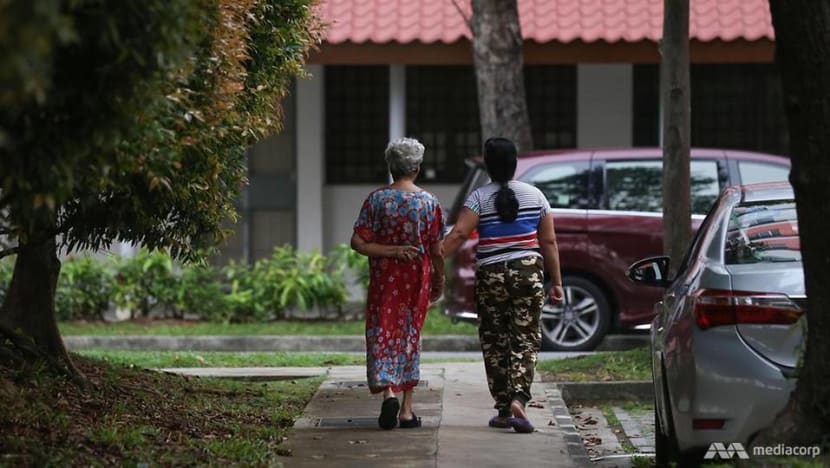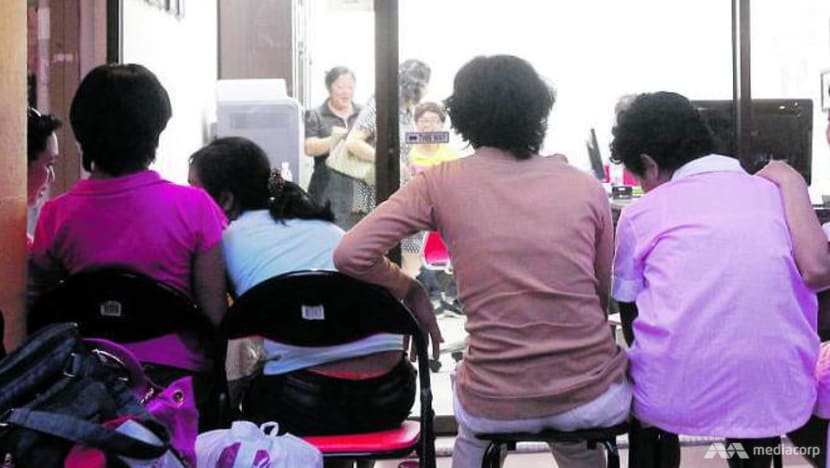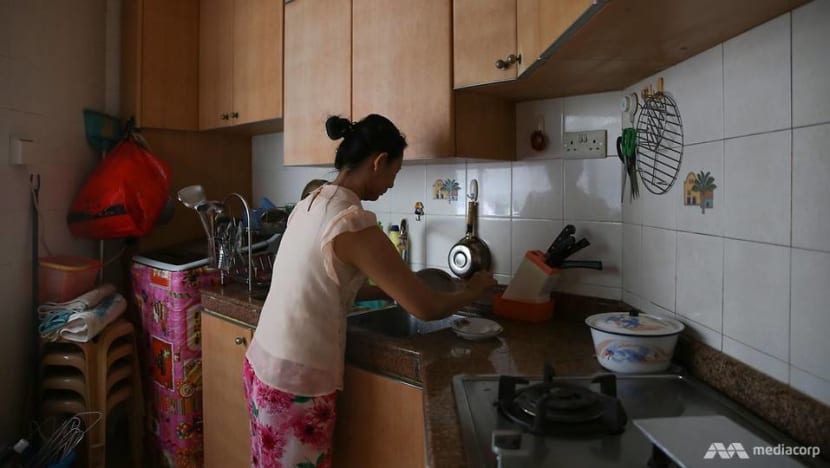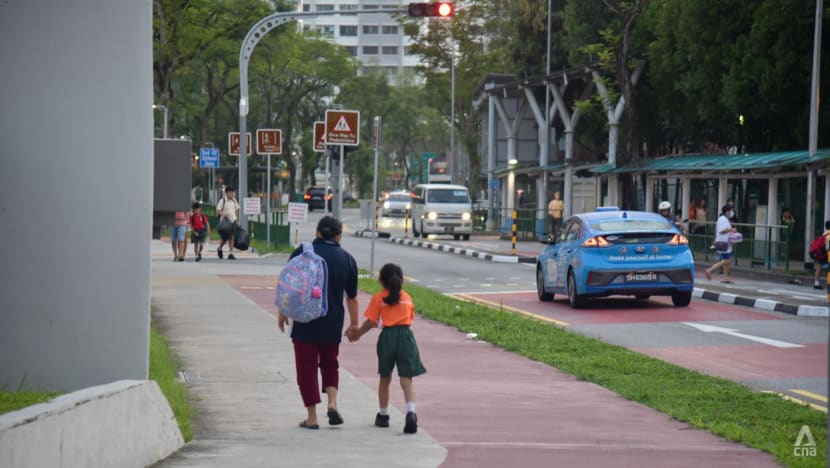IN FOCUS: Why do underage maids risk working illegally in Singapore, and how do they slip through the cracks?
What drives some migrant domestic workers, some as young as 13, to try to work illegally in Singapore? CNA looks at how some manage to find their way here and the problems they face when they do.

A foreign domestic helper is seen strolling with an elderly woman on Oct 31, 2019. (File photo: TODAY/Najeer Yusof)
SINGAPORE: While many Singaporean youths are either in school or serving their National Service, young migrant domestic workers like Eve are coming to the country for work, away from everything they know.
Some do not know how to speak English and are not used to city life. Some are also breaking the law in Singapore.
Eve, who hails from Myanmar, first came to Singapore more than 10 years ago. She was 21 and unable to find a job at home. When an agent went to her village with the prospect of working overseas, she immediately jumped at the chance.
However, she did not meet the minimum age requirement of 23 to be a full-time domestic worker in Singapore.
“I (told) my agent, I want to go to Singapore to work. She say(s) I must be 23, if not I cannot go. I have to change my ID or fake it, so we had to pay a fee to Myanmar agency (to do that).
“They also tell us, if we go to Singapore, we must say we’re 23,” Eve told CNA. She did not want to be named out of concern that the authorities might take action against her, even though she is now in her 30s.
Because she was so young when she left home, Eve said she could not cope with her loneliness and homesickness. She cried every day in the toilet of her employer’s home. Everything, even the concept of electricity, was alien to her.
After a few weeks in Singapore, she regretted her move. "I felt like I’m all alone in this world and I’m in another world,” she said.
The problem of underage maids in Singapore has been a perennial one over the years, with cases cropping up from time to time since the minimum age requirement was introduced in 2005.
In 2018, two 13-year-old migrant domestic workers were sent back to their home country of Myanmar when their true ages were uncovered.
Earlier this month, Zin Mar Nwe, a domestic worker who is also from Myanmar, was sentenced to life imprisonment for murdering her employer’s elderly mother-in-law.
Her passport reflected her age as 23 when she arrived in Singapore in January 2018, but a bone-age test that was subsequently conducted at a hospital showed that she was only 17 at the time. Similar to Eve, her agent had told her to declare her age as 23.
In 2012, Nurhayati, a domestic worker who goes by one name like many Indonesians, was sentenced to 20 years’ jail for killing her employer’s young daughter in 2010.
Nurhayati was just 16 at the time and had lied that she was 24 to meet the minimum age requirement.
YEARLY AVERAGE OF 158 UNDERAGE MAIDS
A Ministry of Manpower (MOM) spokesperson told CNA that from 2018 to 2022, the ministry – which oversees migrant domestic workers – detected an average of 158 underage maids annually, or about six per 10,000. This was comparable to the preceding five-year period.
However, MOM has “seen a marked decrease” in the number of underage maids detected in the last three years after “initial spikes” in 2018 and 2019.
The ministry adopts a comprehensive approach to detect and prevent underage maids working in Singapore, the spokesperson added.
Maid employment agencies must ensure that migrant domestic workers meet the minimum age requirement “through upstream checks such as conducting face-to-face interviews” before they come to Singapore. Errant ones can be penalised through warnings, demerit points, forfeiture of security deposits or prosecution for severe cases, the spokesperson said.
Agencies that receive demerit points will face various additional requirements. For example, those with 12 or more demerit points will be placed under surveillance, while an agency's licence will be suspended or revoked if it accumulates 24.
Those that bring in underage maids can be fined up to S$5,000 (US$3,760), jailed for up to six months, or both under the Employment Agencies Act.
An average of 11 agencies have been dealt with each year from 2018 to 2022 for bringing in underage maids, MOM said. In 2017, the ministry took more than 80 agencies to task – a significant increase from nine that were penalised between 2012 and 2016.
In June 2018, maid agencies received an employment alert that any agencies that place underage maids would be subject to stiffer punishment in the form of partial forfeiture of security deposits, on top of demerit points. This came after more than 15 women were caught in a two-week period.
The following month, the owner of an agency that had brought in one of the 13-year-old Myanmar maids was fined the maximum amount of S$5,000 after admitting that she failed to ascertain the girl’s real age.
The teenager’s agent in Myanmar had declared her age as 23 on her passport. The reality only came to light when she went for her fingerprinting and photo image appointment at MOM.

ONUS IS ON AGENCIES TO CHECK MAIDS' AGE
Some maid employment agencies told CNA that while they have a screening process in place, some domestic workers still manage to get past the checks. Agents from the maids’ home countries are the ones complicit in altering their IDs and passports, they said.
In Singapore, the onus is on maid agencies to ensure that domestic workers brought into Singapore meet MOM’s entry requirements.
Mr Charles Chan, general manager for Able Best Employment Agency, said it has a two-step process in place. The agency first goes through the biodata list from overseas agents, taking note of maids who are reported to be 23 or 24.
“Usually if they are actually under the required age, they will put the minimum required so that the discrepancy is not too obvious,” Mr Chan added.
“We will also take note of their height or weight and facial details, and if the helper is very petite in size … or has obvious child-like features, we will also take special notice of them. This would be more commonly found among Myanmar helpers.”
The agency will not bring maids in if it suspects they are underage, said Mr Chan.
It will then interview those shortlisted for placement in Singapore households and ask them to verify their age. It will also get the maids’ national ID and family documents from their agents to check against their passport details.
Domestic workers that meet the minimum age requirement are usually able to confidently provide information about their previous job and school experience, Mr Chan added.
“We will relate stories of helpers who overstate their age to come to Singapore and when they are found out that they are underage, they will be repatriated back to their home countries and then blacklisted permanently,” he said.
If a maid is hired and comes to Singapore, the agency will then have a face-to-face interview with her and “reaffirm the strict rules” that MOM has in place regarding underage maids.
Similarly, Mr Jeffrey Wong, director of Jforce Employment Service, said it employs people in Myanmar and Indonesia to screen maids and check their documents before they come to Singapore.
Jforce’s sales consultant then conducts another round of document checks and interviews the maids before they go for their settling-in programme. If they do not meet MOM requirements, the agency will send them home immediately.
MOM stipulates that first-time domestic workers must undergo a one-day settling-in programme, where they learn about safety precautions and living in Singapore, within seven days of their arrival.
Despite their best efforts, however, Mr Chan from Able Best acknowledged the “remote possibility” that some maids “scrape through all the checks and pass through all the tests ... as there are no sure and definite means for the agency to confirm (their age)".
Both said that they understand why MOM has set the minimum age requirement.
“If the helper is not mature enough, there is no way that they can perform or would have culture shock. In that case, instead of a plus to the family, (they) become a burden,” Mr Wong pointed out.
MOM previously said that it raised the age requirement from 18 to 23 years to ensure that maids who come to Singapore to work are mature, better able to take care of themselves, and able to adapt to a foreign working environment.
WORK CAN BE "ISOLATING EXPERIENCE"
The need to provide for their families, lack of employment opportunities in their home countries, and promises of a better life are among the reasons why domestic workers go abroad for work, even though they could be breaking the law, said a spokesperson from migrant rights group Humanitarian Organisation for Migration Economics (HOME).
Underage maids will find it more difficult to cope with their work, which can be an isolating experience, especially for first-time domestic workers, the spokesperson added.
“They live and work in their employers' houses, and may not have strong community support, particularly if they have limited rest days and access to communication devices,” she said.
Domestic workers usually approach HOME for help with other issues. While having informal conversations with them or helping with their cases, HOME then discovers that they are underage or possibly underage.
“Some of them may be aware of the requirement but are told by their agents or employers to lie about their age so that they can continue working in Singapore," the spokesperson added.
“Many of them do so as they fear losing their jobs if they are found out, and being blacklisted subsequently. This may make them stay in abusive or exploitative situations.”
If domestic workers are found to be younger than 23 and are reported to be so, they are usually repatriated.
The HOME spokesperson also pointed to a lack of regulation in domestic workers’ home countries.
For example, for about five years until 2019, Myanmar banned its citizens from becoming domestic workers in Singapore, Thailand, Hong Kong and Macau amid concerns of ill-treatment and abuse.
This allowed unscrupulous agents or middlemen to exploit underage workers as they need not follow regular channels, said the spokesperson.
“Since the ban was lifted, HOME has seen fewer underaged domestic workers from Myanmar. However, this issue is not specific to one country, and as long as there are individuals who wish to exploit underage individuals, the issue will persist,” she added.
Over at the Foreign Domestic Worker Association for Social Support and Training (FAST), new maids undergo a two-day onboarding and integration programme to help them adapt to life in Singapore.
FAST is supported by MOM and was founded in 2005 when the minimum age requirement kicked in.
Its chief executive director William Chew said that in 2018, the association had an 83 per cent retention rate for maids who went through the programme. It has not come across underage ones so far.
On the first day, domestic workers learn interpersonal and communication skills, house rules and working norms in Singapore, as well as self-care and motivational skills.
They then get to visit different markets on the second day, learn how to buy groceries and use public transport.
Mr Chew added: “Due to their young age, (underage workers) might not have the mental stability to cope with the culture shock, feelings of homesickness when they first arrive.
"Coupled with a lack of working experience and language barriers, they may find it hard to meet the rigorous expectations of employers in Singapore.”

MENTAL ISSUES
Underage domestic workers are also in a stage of life defined by heightened emotional fluctuations, exploration of self-identity and occasional rebellious tendencies, said psychiatrist Lim Boon Leng, who has treated domestic workers suffering from depressive episodes.
“This period of psychological development, combined with the constraints of a 24/7 work environment and the necessity to constantly take directives – sometimes delivered harshly – from their employers, can create an intense, high-stress environment,” added Dr Lim, who runs Dr BL Lim Centre For Psychological Wellness.
This could worsen a domestic worker’s feelings of frustration, agitation and helplessness, he noted.
Indeed, this happened to Eve when she first arrived from Myanmar.
As the second youngest among eight siblings, she wanted to support her youngest brother and mother, who was very ill and unable to work. Her father had died by then.
She did not know how to use household devices like the oven or microwave, since her village relies on gas. She also could not understand simple words in English like “water”.
“Because I was very young, I cannot hold my feelings," she said.
"When my employer asked me to do something, I did not understand properly, then they scold. Sometimes they’re not patient. I keep crying like that."
She would burst into tears even when her employer raised their voice slightly, she added.
“Sometimes when like not enough food and not enough sleep, or when face difficulties, we call agency but some agency refuse to help us and they don’t even pick up our call. That was very difficult."
Eve’s first employer did not give her cash, saying she wanted to save money for her. She did not have any days off, was banned from using the phone and lost a significant amount of weight from having too little to eat.
She returned home after her two-year contract ended, but ended up coming back to Singapore to continue providing for her loved ones. This time, she met the age requirement.
“It was very difficult and sad for me, but when I go back (to Myanmar), I realise that at least, when I work here, I can still support my family. I forget about my pain … when I see my family,” she added.
During her second employment stint in Singapore, she started interacting with other maids and came across some as young as 18.
While they can confide in one another, this has its limits if their employers do not allow them to leave the house, Eve told CNA.
Even though it is often difficult for underage maids to seek help due to their circumstances, mental health experts offered some ways that they can help if cases come their way.
Forensic psychologist Julia Lam said they can refer the maids to the relevant organisations for resources and support. They can also talk to their employers to come up with solutions or find out if the maid has been abused in any way.
Dr Lam has not treated any underage maids, but said she has seen employers who allegedly committed maid abuse offences. They were referred to her by their lawyers after being charged in court.
These employers told her issues such as the maid looking very young – around 17 years old, contrary to what was shown on their passport. They also seemed childlike, with one employer being afraid that their domestic worker would fall from the flat window when hanging a bamboo pole loaded with clothes.
One maid pleaded with her employer not to be sent back to the agency, due to debts and loans she owed for coming to work in Singapore, Dr Lam told CNA.
For psychiatrists like Dr Lim, their primary role is to diagnose and treat issues like depression or anxiety disorders.
He added: “We also hope to provide a safe space where they can express their feelings, concerns, and experiences, and help them understand and manage their emotions.
“As medical doctors, we are obliged to advocate for them and to report any suspected abuse to the authorities for further investigations.”

Nevertheless, Eve said that while underage domestic workers still manage to slip through the cracks, she feels the authorities have grown “very strict” about it recently.
On her third and most recent stint in Singapore, there were a few girls at the agency where she was staying for a week before moving to her current employer’s home. One of them turned out to be under 23 and was sent home.
During Eve's second employment period, when she was tasked to care for an ill elderly woman, she got to know another maid from Myanmar who was also caring for her. The elderly “ah ma” frequently scolded, spat at them and used her walking stick to hit them.
Eve said that with the benefit of maturity, she could tolerate this by thinking of the woman as her own grandmother. They eventually became very close after a few months.
However, the other maid always grew angry and talked back, Eve said. She was sent back home after some time.
“That’s why I think the Singapore government is right (to) only allow maids who are 23,” Eve added.
“If they are too young, they cannot control themselves.”
Editor's note: This article has been updated to remove a reference to migrant domestic workers suspected to be underage undergoing bone tests. This is after MOM said that such workers would only be required to go for additional interviews.




















